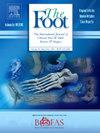Do operative or weight-bearing delays lead to worse outcomes in ankle surgery?
Q2 Health Professions
引用次数: 0
Abstract
Background
Ankle fractures comprise 10 % of fractures seen in ED. Despite this, debate remains regarding the optimal timing of surgery and weight bearing post-operatively. There is no clear consensus whether delaying ankle ORIF leads to better outcomes. There is also debate whether early post-operative weight bearing (WB) impacts post-operative outcomes.
The aim of this study was to investigate whether a delay in operation or a prolonged post-operative weight-bearing plan led to (1) increased complications and (2) poorer outcomes in patient-recorded outcome measures (PROMs).
Methods
In this retrospective study, 160 patients were analysed. Primary outcomes were post-operative complications. Secondary outcomes were PROMs, using EQ-5D and MOxFQ questionnaires.
Data was analysed using SPSS26. Analysis used independent two-tailed Mann-Whitney U tests for continuous data with nominal independent variables, and Kruskal-Wallace tests for ordinal independent variables. Fisher-exact tests were used for categorical variables.
Results
Delay in operation had no statistically significant impact on overall complication rate (p = 0.482). There was no statistically significant difference in EQ-5D (p = 0.433) and MOxFQ (p = 0.325) scores regardless of delay in operation.
Additionally, time spent until WB post-operatively had no statistically significant impact on overall complication rate (p = 0.634). There was no statistically significant difference in EQ-5D (p = 0.358) and MOxFQ (p = 0.089) scores regardless of post-operative WB plan.
Conclusions/Findings
Our results suggest that a delay in ankle ORIF operation does not lead to an increase in complications or poorer PROMs post-operatively, endorsing GIRFT principles. Early post-operative WB also had no impact on complication rate or PROMs, meaning early mobilisation may accelerate patient rehabilitation, facilitate independence, and reduce prolonged inpatient hospital stay.
踝关节手术延迟或负重延迟会导致更糟糕的结果吗?
背景:踝关节骨折占ED骨折的10. %。尽管如此,关于手术的最佳时机和术后负重的争论仍然存在。延迟踝关节ORIF是否会带来更好的结果,目前还没有明确的共识。早期术后负重(WB)是否影响术后预后也存在争议。本研究的目的是探讨延迟手术或延长术后负重计划是否会导致(1)并发症增加和(2)患者记录结果测量(PROMs)结果较差。方法回顾性分析160例患者的临床资料。主要结局为术后并发症。次要指标为PROMs,采用EQ-5D和MOxFQ问卷。数据采用SPSS26进行分析。分析使用独立的双尾Mann-Whitney U检验对具有名义自变量的连续数据,使用Kruskal-Wallace检验对有序自变量。分类变量采用fisher精确检验。结果手术延迟对总并发症发生率无统计学意义(p = 0.482)。不论手术延迟与否,EQ-5D评分(p = 0.433)和MOxFQ评分(p = 0.325)差异均无统计学意义。此外,术后WB时间对总并发症发生率无统计学意义(p = 0.634)。无论术后WB方案如何,EQ-5D评分(p = 0.358)、MOxFQ评分(p = 0.089)差异均无统计学意义。我们的研究结果表明,踝关节ORIF手术的延迟不会导致并发症的增加或术后预后较差,支持GIRFT原则。术后早期WB对并发症发生率或prom也没有影响,这意味着早期活动可以加速患者康复,促进独立,并缩短住院时间。
本文章由计算机程序翻译,如有差异,请以英文原文为准。
求助全文
约1分钟内获得全文
求助全文
来源期刊

Foot
Health Professions-Podiatry
CiteScore
2.00
自引率
0.00%
发文量
37
期刊介绍:
The Foot is an international peer-reviewed journal covering all aspects of scientific approaches and medical and surgical treatment of the foot. The Foot aims to provide a multidisciplinary platform for all specialties involved in treating disorders of the foot. At present it is the only journal which provides this inter-disciplinary opportunity. Primary research papers cover a wide range of disorders of the foot and their treatment, including diabetes, vascular disease, neurological, dermatological and infectious conditions, sports injuries, biomechanics, bioengineering, orthoses and prostheses.
 求助内容:
求助内容: 应助结果提醒方式:
应助结果提醒方式:


